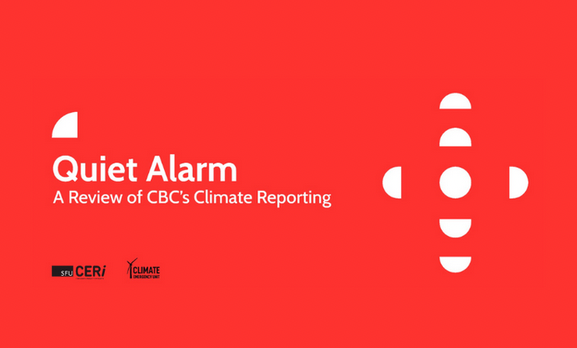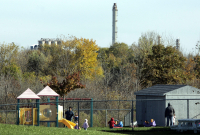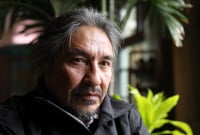Thank you for helping us meet our fundraising goal!
Sometimes, the CBC is exactly the public broadcaster we need it to be in an emergency.
Witness the first year of the COVID pandemic, when CBC hosts and reporters quickly repurposed their kitchen tables and provided us on a daily basis with the best information available on how to keep each other safe.
More recently, when wildfires were wreaking havoc in my home province of B.C. last summer, CBC radio provided remarkable emergency broadcasting, in some cases making heroic efforts to keep people informed of the latest breaking developments, with front-line reporting that was urgent, relevant and sometimes very moving.
When our public broadcaster shows us its best face in times such as these, we’re reminded why having a media organization that can prioritize clear, factual and compassionate communication over profit is so important to a healthy democracy. And it makes political calls to “defund the CBC” ring especially hollow and tone deaf.
But in the face of the most profound crisis we confront — the climate emergency — we have yet to see the CBC be that public broadcaster. For any of us who follow the daily climate news and science on specialized news sites (such as Canada’s National Observer), the disconnect between what’s coming and the coverage in Canada’s mainstream media is deeply disconcerting.
Failure to connect the dots
One of the dynamics that stymies necessary and bold climate action is that, while a majority of Canadians are very worried about the climate crisis, the level of basic climate literacy in Canada is abysmal. Much of the Canadian public does not understand what actually causes climate change. When surveyed, barely over half of Canadians correctly identify the main source of global warming as the burning of fossil fuels. Hence the seemingly contradictory polling results in support of pipelines and expanded oil and gas development, even as people rank tackling climate change as a high priority. Nor do most people have clarity about what the necessary solutions are, or that these solutions exist. That needs to be urgently remedied.
As fellow columnist Chris Hatch has written: “Voters remain unclear about the real-world steps needed and the rationale behind government policies. Six in 10 Canadians either think we can expand fossil fuels and reach net zero, or aren’t sure. Heat pumps remain mysterious. Electrification and batteries, dubious. About half of Canadians aren’t sure whether solar panels emit more greenhouse gases than they end up saving.” Yikes.
In the face of such low levels of public understanding, we desperately need the CBC to lean into its role as public educator.
A year ago, the Climate Emergency Unit (CEU, with which I work) teamed up with Simon Fraser University’s Community-Engaged Research Initiative (SFU CERi) to investigate the CBC’s climate reporting. Led by Doug Hamilton-Evans and Tara Mahoney, the project saw 30 volunteers across the country spend two weeks between April 24 and May 4 carefully monitor the weekday programming of The National, The Current, The World at Six and eight CBC morning radio shows, using a questionnaire to track the climate reporting they heard. A report summarizing the findings – Quiet Alarm: A Review of the CBC’s Climate Reporting – is available here.
The report’s core finding: while the CBC’s coverage of the climate crisis has improved in recent years and is periodically superb, on the whole it remains “sporadic, inconsistent and often absent in daily programming.” CBC is doing a better job of connecting extreme weather events to climate change (in my observation, even more so since the survey period in Spring 2023). But it is decidedly failing to connect the next dot, namely, linking climate disruption to its primary cause — fossil fuels (with notable exceptions, such as this report, or this excellent Fifth Estate piece). And the CBC is rarely providing solutions, much less providing its audience with a sense of agency about how we can help bring such solutions about.
As Quiet Alarm notes, the CBC has committed to strengthening its climate reporting and employs some journalists with a keen understanding of the crisis. We have seen the introduction of some new programs such as CBC Radio’s What On Earth, the appointment of a new international climate reporter (Susan Ormiston) and the launch of a new CBC Climate Dashboard that tracks current conditions and extreme weather events across Canada in real time and compares them to historical trends. These are all welcome developments. But Quiet Alarm suggests that the CBC has yet to meet the standards it has set for itself or climate journalism best practices (developed by international collaborations such as Covering Climate Now) within its flagship national news and local current affairs programs.
Some of the report’s specific findings:
- Only 48 per cent of the broadcasts monitored had a single climate item and of those, half were stories about extreme weather events (specifically wildfires and flooding).
- Of the stories about extreme weather events, 78 per cent failed to mention that climate change makes such events more frequent and severe.
- Only nine per cent of all climate items mentioned the burning of fossil fuels as the primary cause of climate change.
- Only 22 per cent of the climate items clearly discussed solutions to climate change, while only six per cent of those items clearly communicated that there are things the audience could do to address the climate crisis.
The findings varied across regions and programs. Some CBC shows are doing better than others at covering climate. Among the national shows, for example, The Current does notably better than The National. And among local radio morning shows, CBC Vancouver and Victoria provide some very good regular climate programming (such as The Early Edition’s excellent bi-weekly climate panel with Dr. Melissa Lem and Janelle Lapointe out of CBC Vancouver), while the Alberta morning shows do particularly poorly.
Among the report’s key recommendations:
1. Make the connection between the causes of the climate crisis (the burning of fossil fuels), its consequences (extreme weather events) and the communities impacted here and around the world. It would boost climate literacy if, whenever reporting on extreme weather, CBC journalists were to employ language like “climate-induced extreme weather, caused mainly by the burning of fossil fuels.” Those few simple words could go a long way to enhancing public understanding of the connections between oil and gas and the crisis we confront.
2. Develop a daily climate emergency report for flagship local and national news and current affairs shows. Ideally, a national climate emergency unit within the CBC could feed daily content to the flagship shows.
Is there enough news for a daily climate report? As anyone who subscribes to Canada’s National Observer knows well, absolutely! There is a plethora of climate news every day, stories both harrowing and hopeful across Canada and around the world, many of them breathtakingly urgent. But most of them are not reaching the CBC audience.
Along with the release of the Quiet Alarm report, the CEU and SFU CERi teamed up with science journalist Ziya Tong to model three sample episodes of what a daily climate emergency broadcast could sound like, which are available here.
As noted, CBC is producing some great climate programming. Too much of it, however, can only be found on specific shows (The Nature of Things, What on Earth, Planet Wonder) or when you search for it under the climate banner on the CBC news webpage, where already interested and climate-curious people proactively seek it out. The key is that daily climate reporting needs to be embedded in the CBC’s flagship shows — The National, The World at Six and local radio shows in particular.
If our CBC morning radio shows across Canada can have hourly sports and business reports, then surely the CBC can make room for a daily morning climate emergency report, telling us how this battle of our lives is unfolding at home and abroad. A report that provides a balanced mix of the bad news and the hopeful. A report that provides insight, but also a sense of agency — telling us how we can all play our part, not in a trite way, but in real and transformative ways. Let us hear much more about what other countries are doing to confront the climate crisis — many of which are acting with more determination and focus than Canada — so that our sense of what is possible may expand.
The CBC during the Second World War
As readers of this column will know, I think a lot about emergency lessons from the Second World War. Those learnings have much to offer those in the news business.
In a speech to a conference jointly hosted by The Nation and the Columbia Journalism Review in 2019 entitled “What if we covered the climate emergency like we did World War II?”, famed PBS journalists Bill Moyers said to an audience of mostly journalists, “Many of us have recognized that our coverage of global warming has fallen short.” He recalled how, as a child, he used to listen to the radio coverage of the war with his parents, delivered by the renowned journalist Edward R. Murrow and his CBS colleagues. Moyers recounts an amazing story about how, on the eve of the war, CBS headquarters in New York felt there had been “too much bad news” from Europe and directed Murrow and his European-based colleagues to produce a song-and-dance feature to lighten things up (what was “hot” in Europe’s capitals). Murrow, who was the CBS “man in London”, called his counterpart in Berlin to relay the instructions, and then told his colleague, “But we’re not going to do that.” Murrow and his colleagues ignored that absurd directive, and instead they were on scene to cover the Nazi invasion of Poland.
For the next two years, the reporting of Murrow and his CBS team, covering London during the Blitz and the rest of what was unfolding in Europe, dramatically shifted U.S. public opinion in favour of joining the war in support of the Allies (their compelling coverage is credited with helping to bring about a 20 percentage point shift — from majority opposition to majority support — before the bombing of Pearl Harbor). Those reporters were, says Moyers, “On the right side. At the right time. In the right way — reporting on the biggest story of all, the fight for life itself.”
And we remember Murrow not as a biased advocate or propagandist, but as among the greatest journalists of the 20th century — we have prestigious journalism awards in his name. In that 2019 speech, Moyers implored an audience of mainly young and soon-to-be journalists, “Can we get this story right? Can we tell it whole? Can we connect the dots and inspire people with the possibility of change? What’s journalism for? Really, in the war, what was journalism for, except to awaken the world to the catastrophe looming ahead of it?”
Exactly.
Here in Canada, in a fortuitous bit of timing, the Canadian Broadcasting Corporation was established three years before the Second World War. The CBC, then just a radio service, offered daily coverage of the war, with reporting from Europe led by senior foreign correspondent Matthew Halton. And in an era when radio and entertainment options were limited, pretty much everyone shared in the nightly experience of hearing those reports.
Depending on one’s age, the name of Canadian-born actor Lorne Greene conjures up different memories. If you are of my parents’ generation, you likely think of the old TV western Bonanza, in which Greene played Pa Cartwright. If you are a child of the 1970s like me, you may well think of the original (and very cheesy) Battlestar Galactica series, in which Greene played Commander Adama. But before Greene went off to become a Hollywood star, he was a CBC news reader and served in that role right through the war. He was widely and affectionately known then as “The Voice of Doom,” as the Canadian evening news began each night with the latest update from the war, delivered by Greene’s fabulous deep and dramatic voice.
The CBC played a vital role in mobilizing the Canadian public; making the threat real, so Canadians understood what was unfolding as a clear and present danger.
“Surely,” I have been asked, “you are not advocating that the news media become the kind of propaganda outlets we saw in the war.” No, I am not. We want our news to be factual and science-based. But, in the face of a humanitarian emergency and with the fate of civilization as we know it in the balance, I think we rightly want our media to pick a goddamn side. The side of science and of human survival. And if the CBC hadn’t done that in the war, Canadians would have been rightly appalled.
Just as Lorne Greene and Matthew Halton brought Canadians up to speed on the war effort every night during the Second World War — and as CBC did during the first year of the pandemic — today’s flagship CBC news shows like The National and The World at Six can and should do so again.
Rallying to the defense of the CBC
Given a political context in which Conservative leader Pierre Poilievre is leading mass rallies in enthusiastic chants to “Defund the CBC,” maybe the CBC should stop playing duck-and-cover and bring on the fight — motivate us to rally to its defense. If the CBC wants young people in particular to find a compelling new reason to care about the public broadcaster’s future, look no further!
As CNO’s Max Fawcett correctly wrote a few months ago, “the CBC needs to stand and fight... Rather than hoping for the best, the CBC’s leadership needs to prepare for the worst. That means battle-testing their own assumptions and blind spots and bracing for a political environment where their own existence will be called into question. It means presenting a coherent case for its contributions to Canadian life that acknowledges the rapidly shifting landscape and adjusts the corporation’s aims accordingly. And it means gathering as many allies as possible in order to mount a vigorous defense.” (Although Max may disagree with my specific recommendations on that score.)
The CBC’s own research and audience feedback describes “a hunger for constructive solutions” to the climate crisis and indicates that Canadians want to better understand what can be done.
A 2022 survey by Leger found “most Canadians (80%) indicated that they need more information on climate change.”
True, most young people are getting their news from social media, but the CBC alone is our public broadcaster, with a mandate to inform and enlighten. And its compelling reports and investigations can seed content for social media.
Were the CBC to introduce a daily climate emergency report, it may worry about push-back from some quarters (just as it appears very sensitive to push-back with respect to its Gaza reporting). The CBC, like all mainstream media, has a deep-seated nervousness of appearing to engage in advocacy, even when that results in “two-side-ism” to a fault. But again, there is no virtue in “neutrality” when confronting a civilizational threat.
Much like the CBC’s dispassionate coverage of the horror and humanitarian emergency that is being inflicted upon Gaza, the broadcaster’s overly passive and inconsistent climate reporting is incongruous with the scale and scope of the catastrophe that looms.
The ubiquity of climate news and the language employed should align with the gravity of what we confront.
As all good journalists can agree, words matter. In 2019, in a welcome move, the British newspaper The Guardian announced it was updating its style guide and would no longer be using the terms “climate change” or “global warming,” swapping that language for more compelling, urgent and scientifically accurate terminology, such as “climate crisis,” “climate emergency” or “climate breakdown.” The CBC has not followed suit.
“We want to ensure that we are being scientifically precise, while also communicating clearly with readers on this very important issue,” said Guardian editor-in-chief Katherine Viner. “The phrase ‘climate change,’ for example, sounds rather passive and gentle when what scientists are talking about is a catastrophe for humanity.”
Indeed. But is that a message CBC listeners would take from the coverage they currently hear, or are they being provided with something decidedly more subdued? The tenor and irregularity of climate reporting from our public broadcaster is, at present, at odds with what climate scientists are telling us.
The frequency and tone with which we see and hear about these matters carries huge weight.
This is the fight of our lives, after all. And it is the duty of our public broadcaster, in an emergency, to make that clear.
And just maybe, if we see and hear the CBC acting in our collective defense, we will reciprocate in turn.






Comments
Klein: "Hence the seemingly contradictory polling results in support of pipelines and expanded oil and gas development, even as people rank tackling climate change as a high priority."
Give some credit to Canada's petro-progressive leaders. Starting right at the top.
PM Trudeau: "Buying the Trans Mountain pipeline wasn't about hoping to turn a profit for the government. It was about making sure that Alberta crude was not landlocked and was not prisoner to one single customer in the United States.
"I took a lot of grief across the country for buying a pipeline. But I knew that if we want to be able to pay for the innovation, the transformation of our economy to be greener, to be cleaner, we need to get the best possible price for our oil products now, and that means getting out across the Pacific. That meant twinning the Trans Mountain pipeline.
"That's why we bought the pipeline, because it was good for Alberta and it's good for the country." (21-Feb-24)
When the IPCC issued its latest report, then-Environment Minister "Wilkinson reaffirmed Canada's commitment to phasing out fossil fuels and achieving net zero carbon emissions by 2050, but said achieving that target will require money generated by fossil fuels."
"Ottawa says it needs revenue generated by the Trans Mountain pipeline to fight climate change" (CBC, 9-Aug-21)
"[Liberal MP] Qualtrough says the pipeline is a 'transitionary tool' that will help fund Canada's shift to a more climate-friendly economy."
Then-Natural Resources Minister Jim Carr: "Our plan is to use this time of transition to Canada's advantage by building the infrastructure to get our resources to global markets and using the revenues to invest in clean forms of energy." (2018)
Up until the last minute before Pres. Biden cancelled Keystone XL, the Trudeau govt was still advertising that Canada's climate plan had room for new export pipelines transporting oilsands bitumen.
Kirsten Hillman, Canada's ambassador to the U.S.: "Keystone XL fits within Canada's climate plan" (National Observer, 2021)
The Liberals have been hammering on that duplicitous message for years. Echoed by petro-progressive provincial NDP politicians in Alberta and B.C. No wonder progressives believe we can have our cake and eat it too.
Maybe if Mark Jaccard's "climate-sincere" Liberals devoted half as much effort to promoting carbon "tax" rebates as they do to flogging pipelines, they would not be twenty points behind in the polls.
Klein: "But in the face of the most profound crisis we confront — the climate emergency — we have yet to see the CBC be that public broadcaster."
The CBC is also failing in the face of the most profound humanitarian crisis we continue to enable: genocide in Gaza. As Klein alludes to later in his column.
The spineless Mother Corp. is still silencing Palestinian voices and stifling stories on Palestinian loss and suffering. Still refusing to call a spade a spade. Still manipulating coverage to avoid offending the Zionist lobby. And still coming down hard on journalists seeking to give a voice to Palestinian suffering.
"CBC has whitewashed Israel's crimes in Gaza. I saw it firsthand" (The Breach, May 16 2024)
https://breachmedia.ca/cbc-whitewashed-israels-crimes-gaza-firsthand/
The CBC's longstanding bias/cowardice on this file makes it hard to defend. Do we rally behind our public broadcaster and strive to improve it — or toss it on the trash heap?
I totally agree. I am so disappointed with CBC's reporting or lack of reporting on the Climate Crisis. I also feel annoyed that they have resorted to non- news or "fluffy" news stories The National: too many interviews with pop stars, too much sports coverage and some generally petty topics. It seems that the CBC is afraid to have more authentic coverage on Climate Change because they might offend the oil and gas companies. Is this what is going on?
Canadians need to know what is on the horizon in terms of Climate Change. If they knew the truth and understood the causes, maybe more people would be galvanized to do something about it.
And it is true that the CBC is capable of excellent informative news coverage, such as exhibited during the Pandemic.
I shudder at Poilievre's calls to defund the CBC.
This article is right on, the CBC seems to do more harm than good on climate. When the government announced EV targets, the CBC went on a bender to discredit EV's. The coverage was slanted to all the things that people didn't like about EV's, but failed to mention any of the benefits. I have no problem with giving people facts but at least cover it properly. In addition they have business friendly panelists who continually mock climate programs as unnecessary and bad for the economy. These panelists are never confronted about their position and allowed to spew partial truths or just flat out misinformation.
the relationship between deforestation (degradation) and climate change is not discussed. Also, the true GHG emissions from the the chain of production in the nuclear industry is deliberately understated where we are told ad nauseum it's clean and even green! Government and the media are captured by industry and greenwashing is the message. Great the National Observer is speaking out.
Something else CBC could do is drive home the connection, to listeners/viewers, between voters saying that they 'get' climate change, then see-saw vote between 2 main culprit parties (one which essentially is still in climate change denial, and the other which makes half-assed measures to 'be on board'); who say they 'get' climate change then drive trucks and SUVs down the highway at more than 120 km per hour while squawking about the cost of gasoline; and who say they 'get' climate change yet squawk when they're told that heat pumps 'cost more money upfront', as if to say "someone else should pay for it if they want me to buy one". I could go on and on.
CBC could strive to get viewers/listeners to think about changing their attitudes on being part of the solution, not part of the problem; to pay attention to the party climate policies and candidate statements in the real media and on social media; and to think about giving a 'new kid' party on the block a reasonable length of time for a chance to govern to implement the changes we need to make. And if that new kid doesn't do it, choose another 'new kid'. What we've been doing so far in voting is failing us.
Give it a try CBC.
Mind you, on the heat pumps, someone SHOULD pay for it if we want people to buy one. We need it to get done, and paying for it will work better than firing the citizens and getting better more moral ones.
Excellent article that hits the nail precisely on the head. While it's important to have balance in journalism, CBC goes overboard in doing this. For instance, some people think the earth is flat but you don't give equal weighting to such an absurd idea. CBC creates confusion by taking this approach with the climate crisis. It boggles the mind that the Conservatives get away with blaming inflation on the carbon tax while CBC does nothing to point out that wildfires, drought, floods, rising ocean temperatures, etc. have a huge impact on the price of food, lumber and other goods. It's time that CBC stopped sugar coating everything related to climate change and helped educate people.
Great article. But it describes a CBC that has long ago disappeared.
Not that I am an authority any longer. I gave up listening after 2015 when harper could no longer be blamed for the disgusting change of tone and audience. Of course whoever he d had trained and in position could still be there for all I know. I ve tried a few times to recapture that wonderful sense of connection of the 60s and 70s.
The real bringing together of the country both in CBC radio and tv( je m'excuse, radio canada). The sense we were party of a great progressive whole but steeped in history that was very personal to any and all of us. The many many shared stories full of delight and recognition.
Sure positions and ideas change over time. Media has evolved if that s what has happened.
But as often as I try to listen or watch, the level of depraved attacks on the concepts and reality are so egregiously wrong that I ve given up. Hurts to hear.
There s no point in even naming the inspiring Canadians who graced the airwaves, no one remembers now.
It s all greed and MeMeMe and Blame Trudeau( well that s a familiar hatred but back in the day news sources covered both sides by hiring spokepersons who represented them and we could make up our own minds. They also valued progress and expertise.)
Today? Bothsidesism and deep propaganda have wrought their sorcery, to the point that we stand a very real chance of having the most inept and possibly corrupt and foreign controlled creature as Prime Minister.
CBC, you have failed and that failure is costing Canadians, old and new our hope and beautiful country.
I doubt you ll be redeemed in my day. Government has left it too late and without trustworthy news, we are flying in the wind. I listen to otherwise sane people swayed by ridiculous rhetoric and driven to mob beliefs. They warn me I m brainwashed by leftist Liberals and I ask them where they think it s being broadcast. Nothing they ll know about, like this source. Never heard of it and won t subscribe. And they think the CBC is out in Socialist lala land when all it does is spout hard right cant. And ads.
I trailed at my then MPs and influencers about how they were losing support back when it could have been dealt with. Now?
Will there be any epic battles or is the game over for progress?
If PM Trudeau bails, just who exactly is going to lead the battle?
Sure there are a few good people but can they pull it off in time? We dont have a Kamala and we dont even know if she can do it.